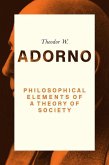Love seems like the most personal experience, one that touches each of us in a unique way that is more personal than social, and hence it is not surprising that it has been largely neglected by sociologists and social theorists. While it has long been a central preoccupation of writers and novelists, love has rarely attracted anything more than the most cursory attention of social scientists. This short text, originally written in 1969 by the eminent German social theorist Niklas Luhmann, goes a long way to redressing this neglect. Rather than seeing love as a unique and ineffable personal experience, Luhmann treats love as a solution to a problem that depends on a wider range of social structures and forms. Human beings are faced with a world of enormous complexity and they have to find ways to order and make sense of this world. In other words, they need certain facilities for action D what Luhmann calls 'media of communication' D that enable them to select from a host of alternatives in ways that will be understood as meaningful by others. Love is one of these media; truth, power, money and art are others. With the development of modern societies, greater demands are made on this medium of love, altering the relationship between love and sexuality and giving rise to the distinctive difficulties we associate with love today. This short text by one of the most brilliant social theorists of the 20th century will be of great interest to students and scholars throughout the social sciences and humanities. It is a concise and pithy statement of what is still the only sociological theory of love we have.
Dieser Download kann aus rechtlichen Gründen nur mit Rechnungsadresse in A, B, BG, CY, CZ, D, DK, EW, E, FIN, F, GR, HR, H, IRL, I, LT, L, LR, M, NL, PL, P, R, S, SLO, SK ausgeliefert werden.
"The textual basis of an early seminar Luhmann held at Bielefeld, this book is essential reading for social and cultural scientists, theorists, and historians concerned about the semantics of love as an institutionalized medium of communication entrusted with regulating intimate relations in modern society." -- Stephan Fuchs, University of Virginia
"I challenge you to find a less sentimental or romantic account of love than this witty and insightful essay by the controversial social systems theorist. It follows the evolution of the concept of love from its Greek roots through to its function as a way of giving meaning to individual experiences and of explaining and justifying the weirdest of behaviours in modern society."
Michael King for Times Higher Education
"The textual basis of an early seminar Luhmann held at Bielefeld, this book is essential reading for social and cultural scientists, theorists, and historians concerned about the semantics of love as an institutionalized medium of communication entrusted with regulating intimate relations in modern society."
Stephan Fuchs, University of Virginia
Michael King for Times Higher Education
"The textual basis of an early seminar Luhmann held at Bielefeld, this book is essential reading for social and cultural scientists, theorists, and historians concerned about the semantics of love as an institutionalized medium of communication entrusted with regulating intimate relations in modern society."
Stephan Fuchs, University of Virginia









